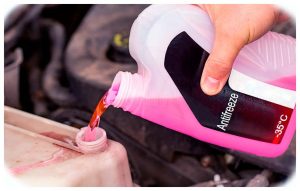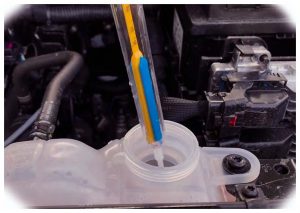Antifreeze is a fluid used in automobiles and other internal combustion engines to protect against frost and corrosion and maintain an ideal engine temperature. It is also known as coolant or heater core fluid, which helps regulate heat transfer in the engine. Antifreeze can be made from either glycol-based liquids or water-based liquids. These different types of antifreeze have different colors and smell, but they all share one thing in common: a sweet smell that can be detected even when the car is not running.
Why Does Antifreeze Have a Sweet Smell?

Possible Causes of Antifreeze Odor
Although the sweet smell of antifreeze may be appealing, it is also an indication that there could be a problem with the vehicle’s cooling system. There are several possible causes for this odor, including:
Leaking coolant: If your car leaks coolant, its sweet smell can easily be detected. Leaks can occur due to a problem with the radiator, hoses or other components of the vehicle’s cooling system.
Evaporated coolant: When too much antifreeze evaporates from the engine and enters the vehicle’s interior, it can cause a sweet-smelling odor. This is often due to a failed seal or gasket in one of the cooling system’s components.
Contaminated coolant: Coolant contaminated with dirt and debris can also produce an unpleasant odor inside your car’s cabin. This type of contamination usually occurs when an old filter fails to remove these particles from the system, and they mix in with new antifreeze.
How To Troubleshoot The Problem
If you notice an unpleasant scent coming from your vehicle’s cabin while driving, it could be caused by one of the issues above. Fortunately, there are some steps you can take to troubleshoot the problem:
Check for visible leaks: Inspect your vehicle’s engine compartment and undercarriage for any signs of coolant leakage. If you find any pooled liquid or wet spots, it could be a sign of a leaking hose or another component.

Check the radiator cap: Ensure your car’s radiator cap is in good condition and properly sealed to prevent antifreeze from escaping into your vehicle’s interior. A faulty radiator cap can allow too much pressure to build up in your cooling system, leading to leaks or evaporated coolant entering your car’s cabin.
How To Fix The Problem
Once you have identified what is causing the sweet smell inside your car, it’s time to take action and fix the problem before further damage occurs:
Repair any leaks: If you’ve found any leaks in your cooling system, you’ll want to repair them as soon as possible. This can be done by replacing the faulty component or hose with a new one. It’s also a good idea to check the entire cooling system for any other leaks that may have gone unnoticed.
Replace the coolant: If your antifreeze is contaminated or low, it’s time to replace it with fresh coolant. Make sure you follow the instructions on how much and what type of coolant should be used for your vehicle.
Flush the system: After replacing the coolant, flush out your vehicle’s cooling system to remove any remaining dirt and debris that could have caused contamination. This will help ensure that your car runs smoothly and remains odor-free while driving.
Conclusion and Preventive Measures
Although an unpleasant sweet smell from antifreeze can be alarming, it is important to recognize why this odor exists and fix it promptly before further damage occurs. By regularly checking for visible leaks, verifying coolant levels, inspecting radiator caps and periodically flushing out systems with fresh antifreeze, motorists can ensure their vehicles remain running in top condition while staying safe on the roads.
In addition to regular maintenance, it is also important to store antifreeze properly and dispose of it responsibly. Old antifreeze should never be poured down a drain since it can be toxic to humans and animals. Instead, take old antifreeze to your local recycling center or hazardous waste facility for proper disposal.
By following these simple guidelines and practicing preventive maintenance, you can keep your vehicle running well while avoiding any unpleasant odors caused by antifreeze in the future.


Add Comment